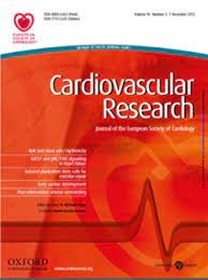Maternal folic acid over-supplementation impairs cardiac function in mice offspring by inhibiting SOD1 expression.
IF 10.2
1区 医学
Q1 CARDIAC & CARDIOVASCULAR SYSTEMS
引用次数: 0
Abstract
BACKGROUND Folic acid (FA) supplementation during pregnancy aims to protect foetal development. However, maternal over-supplementation of FA has been demonstrated to cause metabolic dysfunction and increase the risk of autism, retinoblastoma, and respiratory illness in the offspring. Moreover, FA supplementation reduces the risk of congenital heart disease. However, little is known about its possible adverse effects on cardiac health resulting from maternal over-supplementation. In this study, we assessed the detrimental effects of maternal FA over-supplementation on the cardiac health of the offspring. METHODS AND RESULTS Eight-week-old C57BL/6J pregnant mice were randomly divided into control and over-supplemented groups. The offspring cardiac function was assessed using echocardiography. Cardiac fibrosis was assessed in the left ventricular myocardium by histological analysis. Proteomic, protein, RNA, and DNA methylation analyses were performed by liquid chromatography-tandem mass spectrometry, western blotting, real-time quantitative PCR, and bisulfite sequencing, respectively. We found that maternal periconceptional FA over-supplementation impaired cardiac function with the decreased left ventricular ejection fraction in the offspring. Biochemical indices and tissue staining further confirmed impaired cardiac function in offspring caused by maternal FA over-supplementation. The combined proteomic, RNA expression, and DNA methylation analyses suggested that key genes involved in cardiac function were inhibited at the transcriptional level possibly due to increased DNA methylation. Among these, superoxide dismutase 1 was downregulated, and reactive oxygen species (ROS) levels increased in the mouse heart. Inhibition of ROS generation using the antioxidant N-acetylcysteine rescued the impaired cardiac function resulting from maternal FA over-supplementation. CONCLUSIONS Our study revealed that over-supplementation with FA during mouse pregnancy is detrimental to cardiac function with the decreased left ventricular ejection fraction in the offspring and provides insights into the mechanisms underlying the association between maternal FA status and health outcomes in the offspring.母体叶酸补充过量会抑制 SOD1 的表达,从而损害小鼠后代的心脏功能。
背景怀孕期间补充叶酸旨在保护胎儿发育。然而,母体过量补充叶酸已被证实会导致代谢功能障碍,增加后代患自闭症、视网膜母细胞瘤和呼吸系统疾病的风险。此外,补充足量脂肪酸可降低罹患先天性心脏病的风险。然而,人们对母体过量补充脂肪酸可能对心脏健康造成的不利影响知之甚少。本研究评估了母体过量补充脂肪酸对后代心脏健康的不利影响。用超声心动图评估后代的心脏功能。通过组织学分析评估左心室心肌的心纤维化。分别通过液相色谱-串联质谱法、Western 印迹法、实时定量 PCR 法和亚硫酸氢盐测序法进行了蛋白质组、蛋白质、RNA 和 DNA 甲基化分析。我们发现,母体围孕期过量补充脂肪酸会损害心脏功能,导致后代左心室射血分数下降。生化指标和组织染色进一步证实了母体过量补充脂肪酸会导致子代心脏功能受损。蛋白质组、RNA表达和DNA甲基化综合分析表明,可能由于DNA甲基化增加,参与心脏功能的关键基因在转录水平上受到抑制。其中,超氧化物歧化酶 1 下调,小鼠心脏中的活性氧(ROS)水平升高。结论我们的研究揭示了小鼠妊娠期间过量补充足叶酸不利于心脏功能,会导致后代左心室射血分数下降,并为了解母体足叶酸状态与后代健康结果之间的关联机制提供了见解。
本文章由计算机程序翻译,如有差异,请以英文原文为准。
求助全文
约1分钟内获得全文
求助全文
来源期刊

Cardiovascular Research
医学-心血管系统
CiteScore
21.50
自引率
3.70%
发文量
547
审稿时长
1 months
期刊介绍:
Cardiovascular Research
Journal Overview:
International journal of the European Society of Cardiology
Focuses on basic and translational research in cardiology and cardiovascular biology
Aims to enhance insight into cardiovascular disease mechanisms and innovation prospects
Submission Criteria:
Welcomes papers covering molecular, sub-cellular, cellular, organ, and organism levels
Accepts clinical proof-of-concept and translational studies
Manuscripts expected to provide significant contribution to cardiovascular biology and diseases
 求助内容:
求助内容: 应助结果提醒方式:
应助结果提醒方式:


